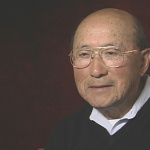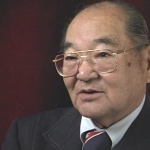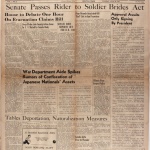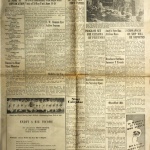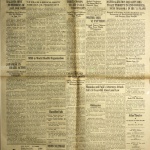Francis Walter
| Name | Francis Walter |
|---|---|
| Born | May 24 1894 |
| Died | June 1 1963 |
| Birth Location | Easton, PA |
Representative Francis Walter (1894–1963), the longtime Democratic representative from Pennsylvania and a notorious hardline anti-Communist, was the House sponsor of the McCarran-Walter Immigration Act of 1952 , which overturned Japanese exclusion and opened naturalization to Issei and other Asian immigrants.
Congressman
Francis Walter, widely known as "Tad," was born in Easton, Pennsylvania, on May 24, 1894. He attended Lehigh University, George Washington University (where he starred on the baseball team) and then Georgetown University, where he studied law. He served in World War I as a naval flier on an anti-submarine patrol, then returned to Easton. After being admitted to the bar in 1919, he became a successful corporate lawyer and director of the Broad Street Trust Company in Philadelphia. He was elected solicitor of Northampton County, Pennsylvania, in 1928. Four years later, he was elected to Congress as a Democrat, riding on the coattails of Franklin Roosevelt . He gained a reputation during the 1930s as a reliable supporter of Democratic positions on social issues, and a close ally of House Speaker Samuel Rayburn. During World War II, Walter was called back into service. He took a leave from Congress and enlisted in the navy as a lieutenant commander, spending six months in naval aviation. He earned notoriety in 1944 by presenting President Roosevelt with a letter opener made from the bones of a Japanese soldier. The war increased his developing interest in international affairs and the problem of refugees. In 1947, he visited Europe as part of a Congressional committee in support of the proposed Marshall Plan for European reconstruction. Three years later, as head of the House Judiciary Committee Subcommittee on Immigration, he toured Germany to study the problem of displaced persons. In 1951, he helped found the Intergovernmental Committee for European Migration. At its annual conferences, held in Europe, delegates sought havens for European refugees.
Ironically, while in 1945 Walter had proposed abolishing the House Un-American Activities Committee (HUAC) and had voted against funding it, as the Cold War intensified, Walter became an increasingly outspoken advocate of internal security measures to fight against Communism. In 1949, once the Democrats regained the majority in the House, he was asked by Speaker Rayburn to join HUAC, in order to burnish its reputation. Once appointed a member of HUAC, he became second in command to its chair, Georgia Representative John Wood, and an active force. In 1950, he travelled to Hawai'i as head of a subcommittee to hold hearings on Communist infiltration in the territory. Several Nisei witnesses testified about their past Party membership, notably Ichiro Izuka, a former president of the International Longshore and Warehouse Union who charged that the ILWU was Communist-controlled.
Immigration Act of 1952
Meanwhile, as an admirer of the war record of Nisei soldiers, Walter became interested in promoting equal naturalization rights. In coordination with Rep. Walter Judd (who had sponsored a series of unsuccessful measures), in January 1950 Walter introduced a resolution to abolish race and ethnicity as factors in naturalization. After passage by the House, and in modified form in the Senate, it was ultimately twinned with a bill, sponsored by conservative Nevada Senator Pat McCarran, that placed numerous restrictions on civil liberties. Because of these restrictions, the bill was vetoed by President Harry Truman in September 1950. While the House voted to override the president's veto, the Senate failed to act before Congress adjourned. Once the 82nd Congress convened in January 1951, the Walter Resolution was folded into a larger omnibus bill on Immigration and Naturalization, HR 5678 (for partisan reasons, Speaker Rayburn insisted that the bill carry Walter's name rather than Judd's), which proceeded through a long set of hearings.
In addition to opening up naturalization for the first time to aliens of Asian ancestry, the act allowed legal entry to a tiny quota of Asian immigrants (135 from Japan, 100 from other nations). On April 26, 1952, the House voted 206 to 68 to approve the bill. It was then merged with a Senate version sponsored by Senator McCarran, and sent to the White House. Despite the large majority vote in favor, the final bill was controversial. Although it slightly enlarged the total number of immigrants admitted annually and ended the absolute ban on Asian immigration, the bill reinscribed the outmoded and racist "national quota" system, with quotas based on the proportion of immigrants in the United States in 1920. It also ended the policy of free entry into the United States by immigrants from the Western Hemisphere, including many Caribbean and West Indian Blacks. Worst of all, the bill denied entry to present and former Communist Party members and allowed the U.S. government to deport and/or bar from re-entry those identified as subversives. Thus, while he approved ending racial barriers to immigration, President Truman vetoed the legislation, stating that the deportation provisions were so vague as to amount to "thought control." Presidential candidates Adlai Stevenson and Dwight Eisenhower likewise publicly opposed the measure. On June 27, 1952 the McCarran-Walter Act was enacted by Congress over Truman's veto.
Japanese Americans divided sharply over the bill. Because winning naturalization rights for the Issei was their primary goal, JACL leaders reluctantly gave the larger bill their support, and helped lobby Congress to override President Harry Truman's veto. However, many Nisei liberals and leftists denounced the bill. In articles in the Nisei press, writers Togo Tanaka and S.I. Hayakawa accused the JACL of putting selfish group interest ahead of all those who would be damaged by the law. Hayakawa proclaimed, "To secure the rights to naturalization of Issei at the cost of all the questionable and illiberal features of the McCarran-Walter Bill appears to be an act of unpardonable shortsightedness or cynical opportunism." [1] Nevertheless, Japanese communities celebrated the passage of the law, and numerous resident aliens (including Hayakawa) rushed to apply for U.S. citizenship. One Japanese American couple paid tribute to the law by naming their newborn son McCarran Walter Ono.
Later Career
As chair of House Subcommittee on Immigration, Walter continued over the following years to resist pressure from liberals of both parties to abolish or update the national quotas, or to pool unused immigration slots from favored countries. When Rep. Emanuel Celler, chair of the Committee on Immigration and Naturalization appointed by President Truman, called in 1953 for changes in the law to grant equal admission to non-Nordics, Walter denounced what he called "professionals including professional Jews shedding crocodile tears" over imagined discriminations in the law. [2] In 1960, he opposed as a "phony issue" the insertion of a plank in the Democratic Platform urging abolition of the national origins quota system as deliberately discriminatory. [3] He did, however, sponsor small bills for the admission of political refugees, and also supported statehood for Hawai'i.
In 1955, following pressure from Democratic leaders, Walter agreed to become chair of HUAC, whose prestige had been further sullied by the fall of Joe McCarthy. He continued to defend HUAC as vital to national security. As he told a group of critics in 1961, "I'm just doing a job, and it's a stinking job, one I don't relish. But one of the things that makes it more difficult is the opposition of those who have more at stake in this fight than anyone else." [4] Similarly, in 1962 he complained of "soft-headed clergymen and college professors who think communism is just innocent fun." [5] During these years, he served as head of the Democratic Patronage Committee, and in 1960 was named was chair of the prestigious House Democratic Caucus. Although he was a favored candidate for Speaker of the House following the death of Sam Rayburn in late 1961, he declined the post on health grounds and announced that he would retire from Congress at the end of the term. While he ultimately changed his mind and was elected for a 16th term in fall 1962, soon after the new Congress convened he entered the hospital with leukemia, and died there on June 1, 1963. At the time of his death, he was the House's longest-serving Pennsylvania Democrat.
For More Information
Daniels, Roger. Guarding the Golden Door : American Immigration Policy and Immigrants since 1882 . New York: Hill & Wang, 2004.
Masaoka, Mike, and Bill Hosokawa. They Call Me Moses Masaoka . New York : William Morrow, 1987.
Robinson, Greg. After Camp: Portraits in Midcentury Japanese American Life and Politics . Berkeley : University of California Press, 2012.
Footnotes
- ↑ "S.I. Hayakawa, Semanticist, Criticizes Support of Walter-McCarren Act," Chicago Shimpo , September 13, 1952.
- ↑ "Attacks on Jews Arouse Congress," New York Amsterdam News , January 17, 1953, 1.
- ↑ "Defends Nordic Entry Quota," Chicago Defender , September 7, 1960, A4.
- ↑ "Francis E. Walter," Christian Science Monitor , June 3, 1963, 14.
- ↑ "Clergy Cautioned on Reds by Walter," New York Times , February 21, 1962, 41.
Last updated May 12, 2014, 8:10 a.m..

